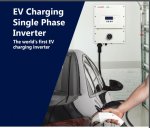- Joined
- Dec 31, 2016
- Messages
- 11,375
- Reaction score
- 2,650
- Gender
- Male
- Political Leaning
- Independent
LOL...
Some electrical engineer.
Just how much current will a 110 volt connection require for a 7 kilo-watt. Afterall, that is the minimum charger by the requirements.
Once again, I call BS of you being an electrical engineer.
I call BS on your understanding of electric cars. You clearly don't own one, otherwise you wouldn't spout such nonsense. There is no charger, other than the components in the vehicles!!!


